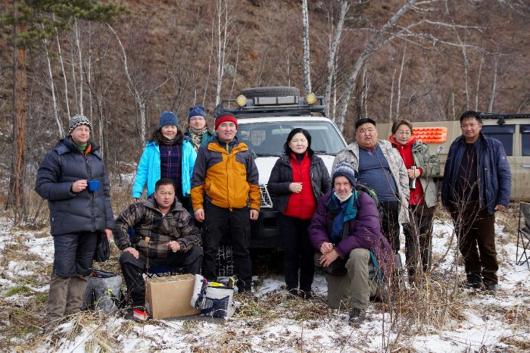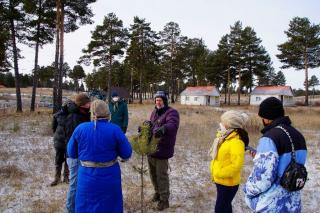
Braving the cold of Mongolia to save the forests
19.11.2021 / 03:32 | Aktualizováno: 13.05.2022 / 09:21
Winter in Mongolia can be the frostiest and the windiest. Especially at night, the temperature usually drops well below -20°C, and even during the day, it is a rare occasion if the temperature rises at least a little close to zero. Despite the harsh winter, there is little snow due to the arid climate and the air is often suffocated by dust from the steppes and smog from domestic heating. Although the air quality situation in the local cities has improved significantly in recent years, Ulaanbaatar is still one of the most polluted cities in the world in the wintertime.

Inspecting the pilot research site built on the land of the Domogt Sharyn Gol cooperative in cooperation with Mendel University and Mongolian universities
The journey began with formal meetings in Ulaanbaatar. After a brief acclimatization, the Faculty of Forestry and Wood Technology team met the Mongolian members of the University Consortium International, chaired by Mendel University, within the premises of the National University of Mongolia (NUM). Representatives of NUM and the German Mongolian Institution for Resource and Technology (GMIT) were present. "The aim of the meeting was to clarify the activities of the Mongolian partners within the STREAM project. In a similar spirit, further negotiations took place at the headquarters of the German Agency for International Cooperation (GIZ), with which Mendel University primarily cooperates on the project within the forestry section”, said Antonín Kusbach, the project's general manager. The meeting ended with a visit to the Czech Embassy to convey their gratitude to Ambassador Jiří Brodský for his continued support and promotion of Mendel University’s activities in Mongolia.
From Ulaanbaatar, the forestry team moved north to the western part of the Khentii Mountains. A visit to the forest nursery of the Domogt Shariin Gol cooperative took place there, which was built thanks to a Czech forestry project in 2015–2018. The visit also included an inspection of the pilot research site built on the cooperative's land by Mendel University in cooperation with Mongolian universities in 2019.
"In Darkhan, Mongolia's second largest city, we then gave a lecture at the School of Agronomy and Business and met with representatives of the university. A field trip was organized with students and academics. The Mongolians experienced practical demonstrations of forest degradation with our team with wide smiles on their flushed faces at an incredible -25 degrees Celsius", said Václav Pecina from the Faculty of Agriculture at Mendel University.
The next stage of the trip focused on the selection of forest areas for the demonstration of forest management in the localities of Yuruu, Bugant (Figure 3) and Tunkhel. In addition to the vastness of Mongolia, very poor quality of the road network, has resulted in several-hours drive on a daily basis to get to the destinations. Along with the selection of areas for the STREAM project, data from long-term measurements carried out by our scientists in Mongolia were also downloaded. In the remaining days, the researchers will travel to the eastern part of the Khentii Mountains, which will be the final part of their Mongolian mission this year.
Contact persons for more information:
Ing. Antonín Kusbach, Ph.D., Department of Forest Botany, Dendrology and Geobiocoenology FFWT at Mendel University;
e-mail: antonin.kusbach@mendelu.cz
Ing. Václav Pecina, Department of Agrochemistry, Soil Science, Microbiology and Plant Nutrition AF MENDELU;
e-mail: vaclav.pecina@mendelu.cz




